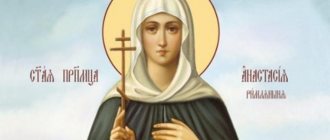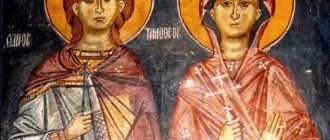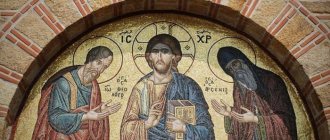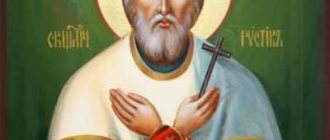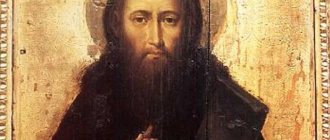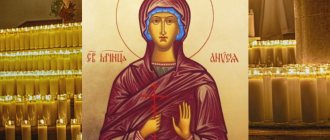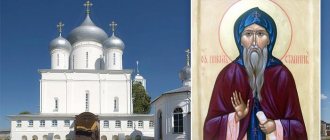"Save me, God!".
Thank you for visiting our website, before you start studying the information, please subscribe to our Orthodox community on Instagram, Lord, Save and Preserve † - https://www.instagram.com/spasi.gospodi/. The community has more than 60,000 subscribers. There are many of us like-minded people and we are growing quickly, we post prayers, sayings of saints, prayer requests, and timely post useful information about holidays and Orthodox events... Subscribe. Guardian Angel to you!
The Holy Martyr Eudoxia was a Samaritan and lived during the reign of Trajan. Youth and beauty were her assets, which she traded. Wealthy admirers of Iliopol were her guests, thanks to which she became a rich and respected lady.
Life of Saint Eudokia of Iliopolis
The Venerable Martyr Eudokia was born in Samaria during the reign of Emperor Trajan and lived in the city of Iliopolis, located in Phenicia of Lebanon. The girl’s parents did not know the True Lord, and therefore the future saint was accustomed to worshiping pagan idols and making sacrifices to them. Because no one spoke to her about the importance of accepting Christ for the salvation of the soul, from her youth she led a sinful and dissolute lifestyle, which caused her heart to harden.
Evdokia was distinguished by the beauty of her face and slender body, so men from different regions of Samaria and even from other countries came to her. Over time, thanks to rich gifts, she became a fairly wealthy woman and even gained the favor of local authorities.
However, the Lord did not want the girl’s soul to perish and sent his servant to her. One night, Evdokia heard in the other half of the house the reading of the Holy Scriptures and the singing of prayers, which said that whoever repents of their sins and accepts Christ as their Savior will find eternal bliss. She also heard words that unrepentant sinners would face eternal torment in fiery hell. At that moment, the grace of the Lord touched the heart of the dissolute woman, and she realized what a burden of sins lay on her soul.
Having difficulty waiting for the morning to come, Evdokia ordered that the man whose singing she had heard at night be brought to her. It turned out to be the pilgrim Herman, the elder was just returning to his monastery after visiting holy places and stopped in this house to spend the night. The girl listened for a long time to the teachings and instructions of the God-fearing elder, and her soul gradually began to come to life and be filled with love for Christ.
Having asked the pilgrim to come to her again a few days later, the woman locked herself in her room and began to pray long and fervently, asking the Lord for forgiveness of sins. Throughout the entire time of prayer, Evdokia adhered to fasting and did not leave her room.
After several days, Herman brought a presbyter with him, and Evdokia, after testing and announcement, accepted Holy Water Baptism. The ceremony was performed by the Bishop of Iliopolis, Theodotus. After this, the woman distributed all her wealth to the poor and homeless, and she retired to live in a monastery, asking the Lord through feats of prayer and repentance to forgive her for her past sinful life. The Almighty not only forgave the former sinner, but also gave her rich spiritual gifts, seeing her sincere repentance.
Over time, Evdokia became the abbess of the monastery, which accepted her after repentance and baptism. At this time, a young pagan entered the monastery under the guise of a monk and began to seduce the woman to return back to Iliopol and lead her former dissolute life. Evdokia forbade him to speak such speeches in the name of the Lord, and the tempter immediately fell dead. The sisters of the monastery were worried that what had happened could be regarded as murder, and fervently cried out to God to reveal his will to them.
Some time later, in a dream, Evdokia heard the voice of the Lord, who told her to get up and pray for Philostratus (that was the name of the false monk), and he would immediately come to life. The saint did just that, and before she had time to finish her prayer, the tempter actually returned to life. He fell at Evdokia’s feet and begged to be forgiven for his sin. After this, he accepted Holy Baptism, returned to his hometown of Iliopol, and until the end of his life he remembered the mercy of the Almighty, which He showed to him through the prayer of the abbess of the monastery.
However, soon another test awaited Evdokia. The residents of Iliopolis slandered the saint and told the ruler Aurelian that, having converted to Christianity, the woman hid her untold wealth in the monastery and did not distribute it to the poor. The ruler ordered a detachment of soldiers to go to the monastery and take the treasures to the treasury, but the Lord made it so that for three days the soldiers could not approach the place where the monastery was located. Then Aurelian sent another detachment, which he put his son in command of. But literally at the very beginning of the journey, the young man severely injured his leg and died on the spot.
Then Philostratus, who had personally experienced the power of Evdokia’s prayer, advised the ruler to ask the abbess to pray for his son. Aurelian wrote a letter to the saint in which he begged for help, Evdokia turned to the Almighty, and through her prayer God resurrected the young man. Seeing such a miracle, the ruler and his entire family repented and accepted Baptism.
Soon, the persecution of Christians for their faith intensified, and Evdokia was captured and brought to trial before the ruler Diogenes, who ordered the saint to be tortured, trying to force her to renounce her faith and worship pagan deities. But just when the military leader began to torture, news came from home that his wife had suddenly died.
Hearing about the gift of healing that Evdokia possessed, he fell at her feet and asked to resurrect his wife. The saint with sincere faith cried out to the Lord and asked to bring Fermina back to life.
By great mercy, the Lord fulfilled what was asked, and the ruler and military leader, having witnessed a great miracle, were baptized along with their families and became faithful followers of Christ. After this, the great martyr lived for some time in the military commander’s house, enlightening newly converted Christians.
The life of the saint describes a case when a military leader experienced the power of prayer addressed to the Almighty. The only son of a certain widow was bitten by a snake, from which the young man died. Then Evdokia told Diodorus that he himself should pray for the deceased and find out how good and merciful the Lord is and how he fulfills the requests of sincerely repentant sinners.
The military leader was initially embarrassed, as he considered himself unworthy of such an honor, but he obeyed the abbess and appealed to the Almighty. After he commanded the dead young man to stand up in the name of Christ, he immediately came to life in front of the astonished townspeople. After this, many more people repented and received Baptism, becoming witnesses of such a miracle.
Soon Evdokia went back to her monastery, where she served as abbess for 56 years. When the cruel persecutor of Christians, Vincent, took the imperial throne, he ordered a fearless Christian woman to be brought to him and executed by cutting off her head. The life of the Venerable Martyr Evdokia indicates that this happened on March 1, between 160 and 170 years.
Life of the Venerable Martyr Evdokia
Once upon a time, the monk Herman arrived in the city where the harlot lived, who read the Holy Scriptures aloud at night. Evdokia heard words about the coming of Christ and the judgment of the Most High, so she could not sleep until the morning. The woman retained the concept of virtue; she began to reflect on her sinful life.
The conversation with the monk Herman turned her mind upside down. She learned about the Orthodox faith and wanted to change her lifestyle. The local elder recommended that she close herself, strictly fast and pray for a week. When she began to repent and cry, Archangel Michael appeared to her and promised help from God. Then she:
- baptized;
- gave all her wealth to the poor;
- settled in the monastery, where she later became abbess;
- helped the poor and hungry;
- did virtuous deeds;
- healed the sick and spent 56 years as a monk.
The devilish powers did not leave Evdokia. Former lover Philostrat wanted to return her to her previous occupation. He secretly made his way into the nunnery under the guise of a monk and began to persuade the woman to give in to temptation. However, he fell dead to the ground. Then the Lord visited Evdokia and told her to bring the seducer back to life. The resurrected Philostratus began to ask for forgiveness and repented of his deeds.
The best article for you, go to: Holy Prince Theodore of Novgorod
Former admirers slandered her that she fled into the desert with gold. Greedy Aurelian sent soldiers after her. However, an unknown force did not allow them into the women's monastery. In the evening many snakes appeared and killed them, and the remaining three told the ruler what had happened. Then he sent his son after Evdokia, who fell from his horse and died.
The resurrected Philostratus came to Aurelian and told him not to pursue the saint, but to ask him to resurrect his son. The king sent a letter to the abbess and received an answer that faith in the Lord would help. The father put the letter on the body of his dead son, he came to life. After this incident, the whole family was baptized.
During the spread of Orthodoxy, many rulers tried to execute the saint. One of them, Diogenes, ordered the nun to be brought in, and the military commander, Diodorus, began to torture her. But he received news that Fermina’s wife was dying, so he turned to the abbess to help. Evdokia began to pray for the woman’s health. Convinced of the power of the Lord, Diodorus adopted Christianity.
The new governor, Diogenes, also began to persecute the saint. He ordered her to be seized and brought to him. Then he accused him of witchcraft, starved him and tortured him. At this time he was struck by lightning. The guard standing nearby began to pray for the resurrection of his master. Thanks to the Lord, Diogenes came to life and accepted the Orthodox faith.
Day of Remembrance
For spreading Christianity, she was slandered and called a witch. The new ruler Vincent ordered the nun to be executed and beheaded. The Orthodox Church celebrates the date of memory of Evdokia on March 14. People call the day Yavdokha. It is at this time that spring begins. In ancient times, people celebrated the holiday in a special way, and women prayed to the saint. The icon of Evdokia the Great Martyr with a candle personifies the path of cleansing from sins.
The best article for you, go to: St. Euthymius the Great
Texts of prayers
There are several prayers with which it is recommended to turn to Saint Eudoxia for help. It is advisable to memorize them so as not to be distracted by reading from the prayer book.
About strengthening faith
O all-praised Holy Martyr Evdokia! You, with your warm love for Christ God, trampled the machinations of the enemy and found the priceless beads of Christ and reached the Kingdom of Heaven. For this reason, I fall to you and with a tender soul and a contrite heart I cry out to you, unworthy passion-bearer: look down from the heights of heaven upon me, who have been tormented by sinful temptations, see my cry: with many sins and troubles the enemy besieges me every day, seeking my destruction. Glorious and all-praised disciple and confessor of Christ, Evdokia! Pray to Christ God, who loved you, to grant me remission of many sins, to strengthen me with His grace to soberly and cheerfully walk the path of His holy commandments and dwell in the holy, blessed heavenly abodes, where you, with all the saints, joyfully glorify the Consubstantial Trinity: the Father and the Son and the All-Holy One Spirit. Amen.
For infertility
O holy servant of God, Holy Martyr Evdokia! Having fought a good fight on earth, you have received in Heaven the crown of righteousness, which the Lord has prepared for all who love Him. In the same way, looking at your holy image, we rejoice at the glorious end of your life and honor your holy memory. You, standing before the Throne of God, accept our prayers and bring them to the All-Merciful God, to forgive us every sin and help us against the wiles of the devil, so that, having been delivered from sorrows, illnesses, troubles and misfortunes and all evil, we will live piously and righteously in the present We will be worthy through your intercession, even though we are unworthy, to see good on the land of the living, glorifying the One in His saints, the glorified God, the Father and the Son and the Holy Spirit, now and forever. Amen.
Troparion
With righteousness, your soul was bound into the love of Christ, / corruptible, and red, and temporary, you passed into oblivion, / like the Words of a disciple: / by the indulgence of passion. having slain,/ you have put to shame the second enemy./ Therefore Christ has granted you a greater crown,/ glorious Evdokia , like the passion-bearer, // pray to Christ God to save our souls.
Translation: By spiritual righteousness, having united your soul with the love of Christ, you have passed through mortal things, earthly blessings and temporal things, as a disciple of Christ: by first mortifying your passions by fasting, and then by defeating your enemy [the devil] by suffering. Therefore, Christ especially crowned you, worthy of glory Evdokia, reverend passion-bearer, pray to Christ God to save our souls.
Kontakion
In your suffering you labored well, / and after your death you sanctified us with outpouring miracles, O all-praised one, / by faith you flee to your Divine Church, / and triumphantly, we pray to you, O holy martyr Eudo kie // may we get rid of spiritual illnesses and receive miracles of grace.
Translation: In your ascetic struggle skillfully and after death you sanctify us with outpourings of miracles, worthily glorified, those who come with faith to your Divine Church, and glorifying us, we pray to you, Venerable Martyr Evdokia, for deliverance from mental illnesses and to receive miraculous grace.
Canon
Song 1. Voice 2
Irmos: Come, O people, let us sing a song to Christ God, who parted the sea and taught the people, even as He brought forth from the work of the Egyptians, as if He were glorified.
Soothe my spiritual embitterment, O Good One, deign Thy passion-bearer Evdokia with prayers, and grant me this praise, O Word.
Who is Your mercy, O Christ, that I confess to the abyss? As salvation has created a haven, the depths of existence are ancient than sins.
Like the good earth, your soul, glorious, the rain will accept the teachings of Herman the Reverend, and the class of piety will bear fruit.
Having received the mental coal into the hearts of Christ, O all-honorable one, through baptism, just as you truly burned boastfulness, flattery and carnal passions.
Theotokos: A God-like village, you have truly appeared, the most spacious and most honest of heavens, the Virgin Mary, and now the angelic face rejoices in you.
Song 3
Irmos: Establish us in You, Lord, the tree of the mortifier of sin, and plant Your fear in the hearts of us who sing to You.
Confirmation, O Christ, and the insurmountable wall in the face of Thy venerable One, having acquired it, the enemies will not be shaken, but will consume it to the end.
Having desired Christ’s beauty and been consumed by His love, you were considered His suffering, God-wise and all-glorious Evdokia.
By the Baptism of Christ, and by your tears, and by this blood of torment, having been cleansed, you were a temple to the Trinity and a place of sanctification.
Theotokos: From Anna the joy of the family blossomed, and you gave birth to the King, O Virgin, and your wives rejoice at your birth, having been released from their oath by you.
Sedalen, voice 8
Having been enlightened by the dawn of the Divine, you left the lovely darkness and you took on life with immaterial flesh, filled with the Divine graces of the Spirit, with a small message you raised the dead . Meanwhile, at the end of the torment, you were adorned with a divine crown and you put the flatterer to shame, Eudokia, equal to the angels, pray to Christ God to forgive sins and grant those who honor holy love crush yours.
Glory, even now, is the Mother of God: As a virgin and one in wives, You, who without seed gave birth to God's flesh, we please all, giving birth to humanity, for the fire settled in You of the Divinity, and as a child You feed the Creator and the Lord with milk. Therefore, the angelic and human race, we worthily glorify Thy most holy Nativity and, in accordance with the cry of Ty: pray to Christ God the forgiveness of sins to grant to those who worship in faith Thy Most Holy Nativity ́.
Theotokos: The Lamb, and the Shepherd, and the Deliverer The Lamb beholds on the Cross, exclaiming, weeping, and, weeping bitterly, crying: the world rejoices, accept deliverance through You, my womb It burns, behold Your crucifixion, even as you endure mercy for mercy. Long-suffering Lord, abyss of mercy and inexhaustible source, be merciful and grant forgiveness of sins through faith to those who sing Your Divine Passion.
Song 4
Irmos: I have heard, O Lord, the hearing of Thy sight, and glorified Thee, the One Lover of Mankind.
You dried up the abyss of godlessness with the river of your divine blood, O glorious Eudokia.
Having first been caught by the prodigals in the wilds of madness, now the faithful are led to the Kingdom of God.
Even though you squandered the corruptible wealth collected for you without righteousness in righteousness, you inherited the incorruptible wealth.
Theotokos: Light has shone, O Lord, who in the night and darkness of sin we are incarnated from the Pure Virgin.
Song 5
Irmos: Light to the Giver and Creator of the ages, O Lord, instruct us in the light of Your commandments: for You, we know no other God.
The Never-Evening Light, having illuminated the truly glorious, will remove the darkness from passion and, pointing the way to dispassion, will show all the light.
The Tsar of God, as if unknown to the Son, was restored by His honest calling upon the deceased son of the Tsar, O most glorious one.
With a courageous thought at the judgment of Christ, the glorious one, you confess, God incarnate, and, truncated by the sword, you rejoice with the martyrdom.
Theotokos: As I hope for Your intercession in the faithfulness of our possessions and the troubles of bitter illnesses around us, we diligently resort to You, O Virgin, O Lady.
Song 6
Irmos: Lying in the abyss of sin, I call upon the unsearchable abyss of Your mercy: lift me up from aphids, O God.
How warm is the zeal of your faith, O martyr Eudokia, that you trampled upon the insistence of the infidels and reaped victory from your suffering.
The currents of tears have combined the torment of the drops of your blood; you have filled the cup of salvation from both.
Formerly filled with stench, with much uncleanliness of existence, now it is filled with fragrance and rejoices with the maiden faces.
Theotokos: Even the joy of the world, Pure Mother of God, rejoice, for those who call with the angel are faithful to Thy joy and destroy our sorrow.
Kontakion, voice 4
In your suffering you labored well, and after your death you sanctified us with an outpouring of miracles, O all-praised one, fleeing by faith to your Divine Church, and, triumphantly, we pray to you, O martyr Evdokia: may we get rid of spiritual ailments and receive miracles and grace.
Ikos
The passion-bearing church of the race appeared, having acquired the garden of immortality in the midst, sowing an honest body, which embraced the fruits of the branches, are firmly sanctified, and visually, they are surprised how Is it true that a dead body exudes healing, enlightening everything? Therefore, come with diligence, now all with me, the humble one, and having cleansed the filth, we will draw miracles of grace.
Song 7
Irmos: I serve the golden image in the field of Deira, three of your youths, heedless of the godless command, in the midst of the fire they were thrown, watered, and irrigated: blessed art thou, O God the Father upon shih.
Who of old caught, the wicked clothe the whole volume of you, flatterer enemy, we trample under your feet, lords call: woe is me, I am overcome, - verb, - Evdokia, the most praiseworthy, yours by immutable appropriation to God, pure.
By abstaining from the wisdom of many of your flesh, having mortified your flesh, you grant to the dead resurrection to God by your boldness and to Him by your undoubted prayer, Eudokia: for He does the will of those who fear Him. .
The Passion of Christ, like a divine decoration, wearing your soul on your neck, you attracted this with incorruptibility desire, and from there you hoop your bride, immaculately calling: Blessed be God the Father upon Shih.
Theotokos: First Gideon, proclaiming Thy, Pure, Divine Nativity is revealed, the oakryn bears, full of water, from the south of the fleece the strain: all for the Divinity dwells in Thee, Most Pure, Blessed Plo The depths of Your womb.
Song 8
Irmos: Into the fiery furnace of the Jewish youths who came down and the flame in the dew of the transfigured God, sing the works of the Lord, and exalt them to all ages.
As if you have come in your mind to the true Healer, be comfortable with enduring fleshly ulcers and fiery bitter illness, O all-glorious martyr, bless Christ forever and ever.
You crushed the turmoil of troubles with the core of the cross and saved your soul’s feeding ground in the Kingdom of God, O glorious one, blessing Christ forever.
You took away the ugliness of passions and covered your soul with the red robe of dispassion, and even Christ, who betrothed your bride, placed you in heavenly temples.
Theotokos: By You, the great-grandmother, the Mother of God, is freed from condemnation, and now women suffer for Christ, and female nature rejoices, as the first martyr cries out, the virgin Thekla.

